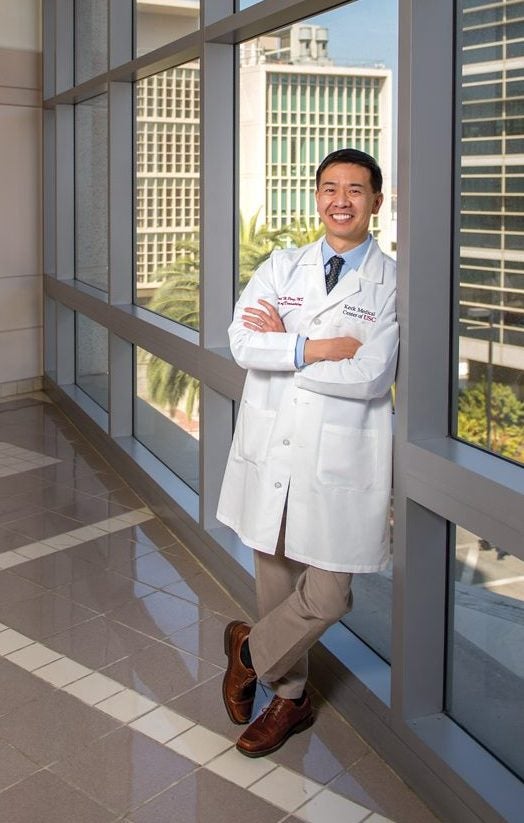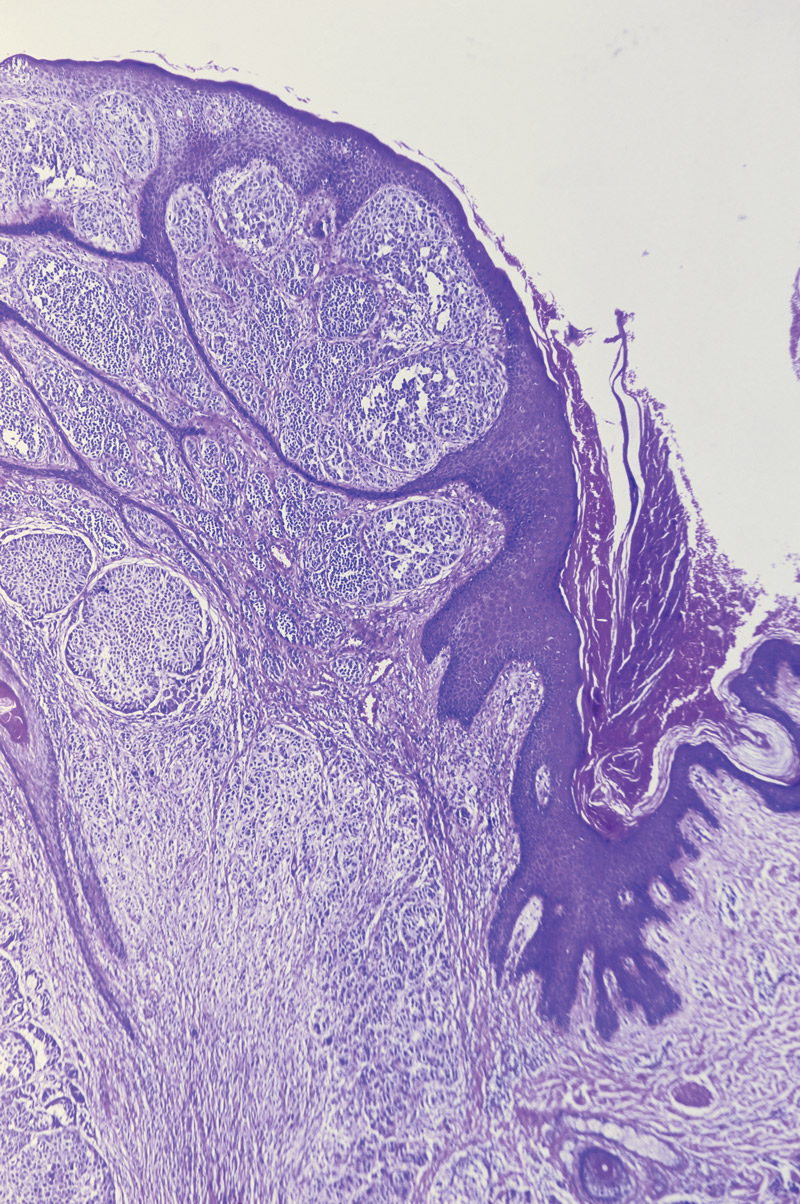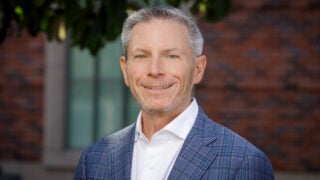Keck Medicine Dermatologists Tackle the Toughest Skin Problems
Skin can be your body’s first line of defense against disease. Here’s how physicians keep it healthy.
When David Peng was training to be a physician, he wanted nothing less than to save the world. It was the 1990s, and young doctors-to-be were vying to enter hot fields. A flurry of advances in device technology and the artificial heart led some to cardiology. Others aimed to save lives through desperately needed AIDS research.
During a dermatology rotation, an attending physician urged Peng to consider a different route.
In dermatology, a subspecialty that many choose for its reasonable hours and lucrative pay, Peng would face less research competition than in other fields, the physician told him. “He says, ‘You’d be a big fish in a small pond—and you’d have a greater impact if you did,’” Peng recalls.
Fast forward two decades, and he’s making a difference as the contagiously enthusiastic chair of the Department of Dermatology at the Keck School of Medicine of USC. Four years after Peng’s arrival from Stanford University, the department has tripled in size to 18 physicians, with new hires recruited from top residency programs like Harvard University and University of California, San Francisco. They’ve brought with them a zeal for combining patient care with research, both clinical and lab-based. Keck Medicine of USC dermatologists today are making advances against melanoma and other skin cancers, psoriasis, allergic reactions and even leprosy. As for Peng, his original goal has evolved into a more defined, if no less audacious, one for Keck Medicine dermatology. “We are going to go as far as science can carry us,” he says.
?
SKIN’S HEAVY LOAD
To listen to Peng, you’d think there was no more exciting organ in the body than the skin. Yes—it’s an organ. Skin isn’t just the body’s largest organ, but its heaviest. “We used to think it was just a bag, essentially, that kept everything intact,” Peng says. Today physicians see it as the body’s first line of defense.

The skin has lots of duties, as he explains. It’s a barrier that prevents disease. It’s also an early alert system for trouble, thanks to circulating immune cells that help the body fight off early signs of infection. Of course, it’s a vehicle for our sense of touch. And it provides a home for bacteria that can influence and alter the body’s immune system.
But with responsibilities come problems, and skin can suffer from a variety of them.
Peng’s own research focuses on melanoma, the deadliest form of skin cancer, and on the genetics of people who develop severe drug rashes, trying to identify patients who should avoid certain medicines. But these days, his primary concern is the welfare of his department.
“Every good chair considers the department’s success to be their metric for their own personal success,” he says. “I root for my faculty and I try to give them the opportunity to do well.”
Advances in treatment come from rigorous science, so Keck Medicine dermatologists are encouraged to dive into research. It’s a philosophy that sits well with members of the physician team.
For dermatologist Ashley Crew MD ’09, her research focus means she gets the chance to study a topic that could help countless patients: how the internet can increase access to dermatology care, particularly among underserved populations. Los Angeles County uses a program called eConsult, which allows specialists to offer long-distance consultations to primary care physicians across the county. Crew is part of a team of researchers investigating the effort’s success in caring for skin problems and how it can be tweaked to further improve care and outcomes for patients.
She’s also co-chair of a multidisciplinary dermatology-rheumatology clinic. The clinic began as a way to treat patients with psoriasis, a common, chronic skin condition characterized by scales and dry, pink patches. But many psoriasis patients also suffer from arthritis — a rheumatologic disease. Now the multidisciplinary clinic allows people with a wide spectrum of rheumatologic conditions to be seen by physicians from both dermatology and rheumatology, helping patients “get a cohesive plan in place for their treatment,” Crew says.
The clinic’s work is buttressed by research done by fellow Keck Medicine dermatologist April Armstrong. A graduate of Harvard Medical School, Armstrong did stints at the University of California, Davis and the University of Colorado before Peng recruited her in 2015. Part of her psoriasis research examines whether the skin condition is also a sign of internal issues. “We’ve found that patients with severe psoriasis have increased risk of heart attacks, strokes and death related to their cardiovascular system,” says Armstrong, who is associate dean of clinical research for the medical school and director of the psoriasis program. “We’re working to see if any of our current therapies can change that systemic inflammation.”
?
BRAIN POWER
Another major area of dermatology research is skin cancer, and Peng isn’t alone at USC in targeting it. Dermatologist Binh Ngo studies genetic mutations in melanoma, trying to predict important characteristics such as its likelihood to recur or spread — or whether genetic mutations alone can point out whether a mole is cancerous or benign.
Ngo also looks at the incidence of skin cancers in organ transplant patients. Basal cell cancer is the most common form of skin cancer in the general population. But in transplant patients, due to immunosuppression, more-aggressive squamous cell cancer is seen up to 250 times more than in the general population. These carcinomas usually appear several years after transplantation, she says. Most at risk? Caucasian patients, because their skin has fewer protective, pigment-producing cells called melanocytes, and heart transplant patients, because they take the most immunosuppressant drugs.
Then there’s a disease that many think no longer exists: leprosy, also known as Hansen’s disease. Every year, about 200,000 people worldwide are diagnosed with the infectious disease, and it’s a specialty of dermatologist Maria Teresa Ochoa, who runs Keck Medicine’s leprosy clinic. The clinic is one of only three of its kind in the state and the largest in the nation, tracking several hundred cases of the disease.
The trick to treating leprosy patients, Ochoa says, is early diagnosis. “If they come to the clinic in time, they are going to be fine,” she says. “There are a lot of misconceptions, like is it very contagious? No, it is not very contagious. And there is treatment.”

Peng likes to talk about the brainpower and dedication of the physicians around him, such as Ochoa, but it’s clear from talking to them that he’s the department’s lodestar. Ochoa and Ngo praised Peng’s determination to help faculty members turn research ideas into reality. “Sometimes, in an academic institution, you may have the idea for something, but you just can’t make it happen,” Ngo says. “He’s a very strong supporter.”
Crew, who was mentored by Peng as a student, credits him with her choice of specialty. “If you did a survey of dermatologists in my generation,” she says, “I think there are many dozens of us who went into dermatology because of Dr. Peng. … His passion, enthusiasm and desire to push the specialty forward is infectious.”
And Armstrong calls him “the main reason I’m at USC.” Peng, she says, “is a terrific chair, passionate and compassionate. … He always asks what he can do to make our job easier.”
The hope, Peng says, is to make more possible: more quality clinic time, more opportunities for lab and clinical research. There are plenty of dermatologists who can treat common skin conditions and do cosmetic procedures and surgeries, he says. Keck Medicine’s dermatology group aspires to more. “We want to be thought leaders,” he says. “We want to be research leaders.”
So he invests time and resources in the recruitment and support of top dermatologists from around the country. Together, he says, Keck Medicine skin specialists can focus on treating — and solving — the toughest cases. Says Peng: “We want to be the referral point for anyone who doesn’t know the answer for one of their patients. … We’ll be the dermatologists for dermatologists.”



